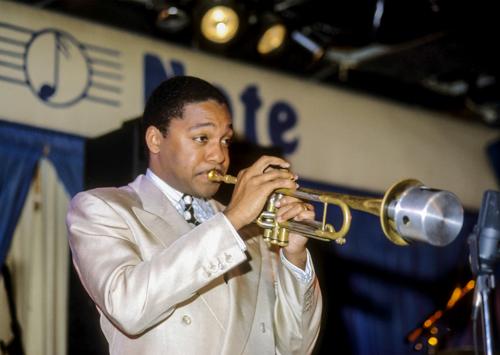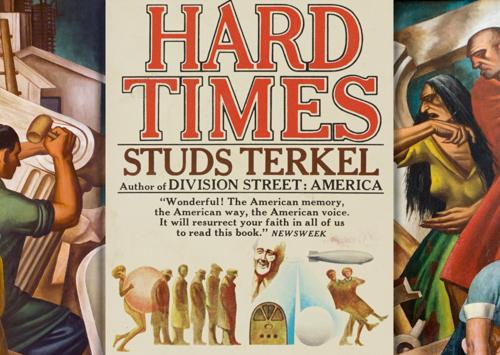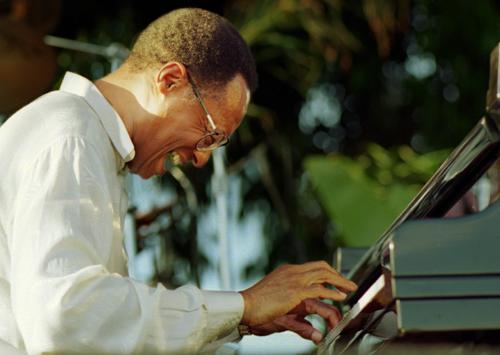Listen to New Voices on Studs Terkel our partnership with 826CHI-here! Read the Story
Showing 1 - 15 of 42 results
-
Wynton Marsalis discusses his musical upbringing
Nov. 5, 1985 Terkel comments and presents a musical performance by Wynton Marsalis
-
Woody Herman in conversation with Studs Terkel
Apr. 19, 1984 Interviewing bandleader and jazz musician Woody Herman.
-
Wild Bill Davison discusses his upcoming show at the Jazz Showcase
Apr. 24, 1984 American jazz cornet player Wild Bill Davison known for his wild ways, discusses his career in jazz music and life in Chicago. Davison rubbed elbows with all the Chicago bigwigs from Al Capone to jazz legends such as Fats Waller.
-
Terkel comments and presents "Hard Times: an Oral History of the Great Depression"; Chapter 3
1971 Presenting "Hard Times: An Oral History of the Great Depression" Chapter 3: Big Business & A Portrait of Two Women. William Benton credits Pepsodent's survival of the Great Depression to Amos 'n Andy. Arthur Robertson talks about the initial aftermath of the 1929 crash as a Wall Street businessman. Sidney Weinberg discusses the confusion on Wall Street after the crash and praises FDR's programs. Jimmy McPartland talks about the importance of working and the success of WPA to boost morale.
-
Studs comments and presents a concert at the Fairmont Hotel with Ramsey Lewis
Dec. 18, 1989 Presenting a concert at the Fairmont Hotel with jazz pianist, composer and radio host Ramsey Lewis.
-
Stan Getz, Penny Tyler in conversation with Studs Terkel
Aug. 29, 1988 Interviewing tenor saxophonist Stan Getz and jazz promoter and critic Penny Tyler.
-
Presenting a performance of Judy Roberts and Jim Cox
Nov. 8, 1989 Musical performance by Judy Roberts and Jim Cox
-
Presenting a concert at Oak Park Mall with jazz pianist Art Hodes and blues musician Corky Siegel
Jun. 15, 1983 Terkel comments and presents a concert at Oak Park Mall
-
Lawrence (Bud) Freeman discusses jazz with Studs Terkel
May. 11, 1971 Studs Terkel interviews Lawrence "Bud" Freeman about his career in jazz.
-
Lawrence (Bud) Freeman discusses his career as a tenor sax jazz musician
Dec. 1, 1980 Studs interviews Bud Freeman about his career in Jazz and his book, "Working" as well as his album, "Complete Bud Freeman." Freeman shares stories about his dad and brother during his childhood. He discusses various songs from his album and shares stories about his interactions with other jazz musicians. Studs reads a few passages from Freeman's book. They discuss how Freeman's creative practices and how his music has changed over the years. Musical pieces are removed from this edited version of the original recording.
-
Lawrence (Bud) Freeman discusses his career as a jazz tenor sax player and his album "Complete Bud Freeman"
Apr. 15, 1982 Studs interviews Lawrence Freeman about his career in jazz. Studs notes that he first interviewed Freeman in 1939 as his first guest on his radio program with WGES. Freeman shares the names and events of influences in his life. He describes his interactions with other jazz musicians throughout his career and shares some stories about his brother, father, and childhood. Studs quotes Mark Miller of the Toronto Globe, music critic, for what he notes about Freeman.
-
John Frigo in conversation with Studs Terkel
Oct. 1, 1987 Interviewing jazz violinist and composer Johnny Frigo.
-
John Frigo in conversation with Studs Terkel
Sep. 21, 1994 Interviewing jazz violinist and composer Johnny Frigo.
-
Jimmy McPartland and Buddy Tate discuss their careers as jazz musicians
Sep. 13, 1977 Jimmy McPartland and Buddy Tate share stories of working with different musicians throughout their career and explain why Kansas City musicians are recognizable from other musicians. Music is played throughout from both of the musicians: "Logan Square"- Jimmy McPartland & Art Hodes, "When I'm Blue"- Buddy Tate, "I'm Coming Virginia"- Jimmy McPartland, "Kansas City Joys"- Buddy Tate, "Singin' the Blues Till My Daddy Comes Home"- Jimmy McPartland, "Tickle Toe"- Buddy Tate, "Riverboat Shuffle"- Jimmy McPartland, "Sunday"- Buddy Tate.





